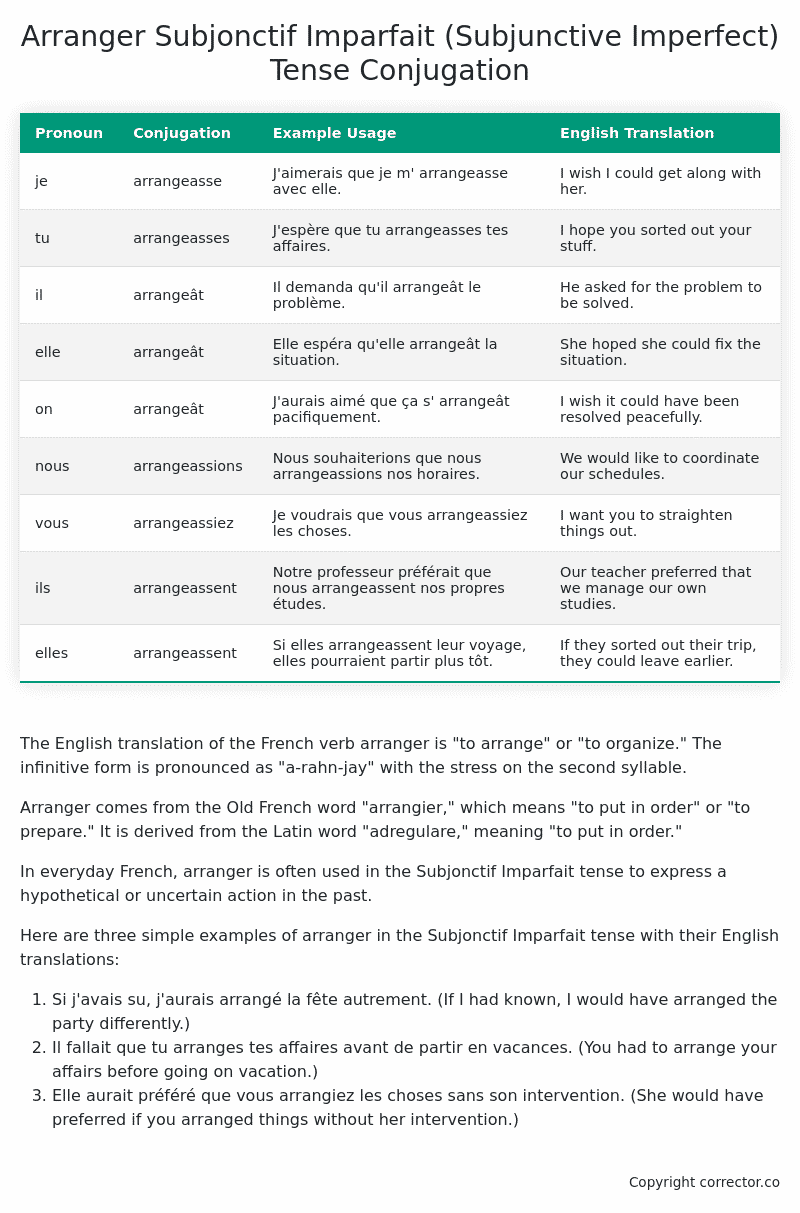Subjonctif Imparfait (Subjunctive Imperfect) Tense Conjugation of the French Verb arranger
Introduction to the verb arranger
The English translation of the French verb arranger is “to arrange” or “to organize.” The infinitive form is pronounced as “a-rahn-jay” with the stress on the second syllable.
Arranger comes from the Old French word “arrangier,” which means “to put in order” or “to prepare.” It is derived from the Latin word “adregulare,” meaning “to put in order.”
In everyday French, arranger is often used in the Subjonctif Imparfait tense to express a hypothetical or uncertain action in the past.
Here are three simple examples of arranger in the Subjonctif Imparfait tense with their English translations:
- Si j’avais su, j’aurais arrangé la fête autrement. (If I had known, I would have arranged the party differently.)
- Il fallait que tu arranges tes affaires avant de partir en vacances. (You had to arrange your affairs before going on vacation.)
- Elle aurait préféré que vous arrangiez les choses sans son intervention. (She would have preferred if you arranged things without her intervention.)
Table of the Subjonctif Imparfait (Subjunctive Imperfect) Tense Conjugation of arranger
| Pronoun | Conjugation | Example Usage | English Translation |
|---|---|---|---|
| je | arrangeasse | J’aimerais que je m’ arrangeasse avec elle. | I wish I could get along with her. |
| tu | arrangeasses | J’espère que tu arrangeasses tes affaires. | I hope you sorted out your stuff. |
| il | arrangeât | Il demanda qu’il arrangeât le problème. | He asked for the problem to be solved. |
| elle | arrangeât | Elle espéra qu’elle arrangeât la situation. | She hoped she could fix the situation. |
| on | arrangeât | J’aurais aimé que ça s’ arrangeât pacifiquement. | I wish it could have been resolved peacefully. |
| nous | arrangeassions | Nous souhaiterions que nous arrangeassions nos horaires. | We would like to coordinate our schedules. |
| vous | arrangeassiez | Je voudrais que vous arrangeassiez les choses. | I want you to straighten things out. |
| ils | arrangeassent | Notre professeur préférait que nous arrangeassent nos propres études. | Our teacher preferred that we manage our own studies. |
| elles | arrangeassent | Si elles arrangeassent leur voyage, elles pourraient partir plus tôt. | If they sorted out their trip, they could leave earlier. |
Other Conjugations for Arranger.
Le Present (Present Tense) Conjugation of the French Verb arranger
Imparfait (Imperfect) Tense Conjugation of the French Verb arranger
Passé Simple (Simple Past) Tense Conjugation of the French Verb arranger
Passé Composé (Present Perfect) Tense Conjugation of the French Verb arranger
Futur Simple (Simple Future) Tense Conjugation of the French Verb arranger
Futur Proche (Near Future) Tense Conjugation of the French Verb arranger
Plus-que-parfait (Pluperfect) Tense Conjugation of the French Verb arranger
Passé Antérieur (Past Anterior) Tense Conjugation of the French Verb arranger
Futur Antérieur (Future Anterior) Tense Conjugation of the French Verb arranger
Subjonctif Présent (Subjunctive Present) Tense Conjugation of the French Verb arranger
Subjonctif Passé (Subjunctive Past) Tense Conjugation of the French Verb arranger
Subjonctif Imparfait (Subjunctive Imperfect) Tense Conjugation of the French Verb arranger (this article)
Subjonctif Plus-que-parfait (Subjunctive Pluperfect) Tense Conjugation of the French Verb arranger
Conditionnel Présent (Conditional Present) Tense Conjugation of the French Verb arranger
Conditionnel Passé (Conditional Past) Tense Conjugation of the French Verb arranger
L’impératif Présent (Imperative Present) Tense Conjugation of the French Verb arranger
L’infinitif Présent (Infinitive Present) Tense Conjugation of the French Verb arranger
Struggling with French verbs or the language in general? Why not use our free French Grammar Checker – no registration required!
Get a FREE Download Study Sheet of this Conjugation 🔥
Simply right click the image below, click “save image” and get your free reference for the arranger Subjonctif Imparfait tense conjugation!

Arranger – About the French Subjonctif Imparfait (Subjunctive Imperfect) Tense
Formation
Common Everyday Usage Patterns
Interactions with Other Tenses
Subjonctif Présent
Indicatif Passé Composé
Conditional
Conditional Perfect
Summary
I hope you enjoyed this article on the verb arranger. Still in a learning mood? Check out another TOTALLY random French verb conjugation!


